
Pills, powders, and poultices, oh my! Chinese medicinal formulas come in many shapes and sizes – and even varied administration methods. Let’s learn a little more about one of our favorite ways to take our Chinese herbs: liquid extracts.
Liquid extracts are a unique way to take herbal medicine. Tinctures are commonly used in Western herbalism and homeopathy. While there is a history of tinctures and extracts in Chinese medicine as well, they are less common traditionally than in other disciplines, but their use is growing.
The modern age has allowed Chinese medicine to join the others in the use of liquid extracts and tinctures for health-promoting herbal formulas. Today, many of our favorite Chinese herbal formulas are available to take in a liquid extract form. This has made getting into the habit of taking our helpful Chinese herbs easier than ever, and made herbal medicine a simple, tasteless treat for picky pets and children.
Are you ready to learn about the benefits and ease of our line of liquid extracts? Let’s dive into the basics of herbal liquid extracts and learn a little more about some of our favorite liquid extract products available here at Best Chinese Medicine.
What are Liquid Extracts?
Liquid extract formulas are concentrated versions of the Chinese medicine formulas you know and love. Traditional herbal medicine can take many forms: pills, powders, decoctions, tablets, and liquid extracts (or tinctures). These varied forms depend on the nature of the herbs, the reason for use, and the expected recipient of the medicine. Liquid extracts are an easy-to-take form of Chinese medicine that can be used by all ages and even our pets.
Liquid extracts are basically a highly concentrated version of an herbal formula that has been cooked and reduced to create a dissolvable tincture. Liquid tinctures can be useful for a wide variety of health issues and needs and are often a convenient way to stay on top of your daily herbal doses.
At Best Chinese Medicine, all of our liquid extracts are sourced from Golden Lotus Herbs, a reputable company based out of Beaverton, Oregon. Golden Lotus Herbs ensures the highest quality herbs in their extracts and chooses organic and ethically harvested herbs whenever possible. In fact, many of the herbs used in their extracts are cultivated in bio-regional farm communities by locals who have learned to grow these special medicinal plants generation after generation. These traditional methods do not involve pesticides, fungicides, sulfites, or fumigation – processes that are too readily relied upon with modern agricultural practices.
After the herbs are harvested, they are carefully inspected and manufactured in the US under strict and safe quality controls. The herbs are decocted and concentrated into an 8:1 potency. This high potency allows us to take a very small amount, one teaspoon, of the final resulting liquid as a single dose. With traditionally prepared decoctions, up to 6 cups of liquid might be prescribed per day. Liquid decoctions are inherently more potent and require less preparation and volume.
History of Liquid Extracts in Chinese Medicine and Around the World
The traditional use of Chinese herbal extracts began with alcohol solutions for topical formulas. These formulas were often used for pain related conditions or even broken bones. Eventually, liquid extracts were developed for internal conditions in addition to the decoctions and powders that were commonly used.
Other medical traditions also employed the use of tinctures and extracts early on. Ancient Egyptian and Arabic medical practices included distillations of herbs in alcohol and the practice traveled to Western Europe. By the 1500s, tinctures were a popular form of medicine around the world.
Today, Chinese herbal extracts are still used in many ways. It is a popular method for administering herbs to children and pets, as well as those who can’t or don’t like to swallow pills. Extracts are also still used topically for pain conditions. Scientists have begun researching potential cures with Chinese herbal extracts. An extract of the herb, Ku Shen, has been studied in laboratories for inhibiting growth of antibiotic-resistant bacteria such as MRSA, as well as candida and cancer cells.
With ongoing research and an increase in interest in the use of Chinese medicinal herbs, the future of liquid herbal extracts seems exciting. In the meantime, we can continue to enjoy and benefit from these easy-to-take, health-promoting formulas.
How to Take a Liquid Extract
Liquid extracts are remarkably easy to take, which makes them amazing choices for pets, children, or people on the go.
Liquid extract formulas are usually dissolved in a cup of warm water, then drank. Most formulas will require 2-3 doses per day. It can be helpful to take your liquid extracts before or after meals to ensure you get the full 2-3 doses per day. Getting the proper dose ensures the full effectiveness of the formula.
The typical dose recommended for our liquid extract formulas is 1 teaspoon (or 60-90 drops) in a cup of warm water 2-3 times daily. Many of the extracts do contain alcohol for best preservation and absorption. If you are avoiding alcohol or wish to evaporate the small alcohol content, simply dissolve the dose into hot water and let steep for 5 minutes. This will remove any alcohol from the extract. Drink the water as normal.
When to Use a Liquid Extract
Liquid extracts can be used in place of typical Chinese pill, tablet, or tea formulas. While only some Chinese herbal formulas were traditionally made as a tincture or extract, today we have access to many of the traditional formulas in this convenient dosing method.
Here are some reasons you might choose to use a liquid extract rather than a pill, powder, or tea.
- You prefer the ease of adding your herbs to the water you already drink throughout the day.
- You don’t like to swallow pills.
- A liquid extract is easier for you to remember than pills.
- The smaller bottle more easily fits in your bag to travel with you wherever you go.
- The formula is for your pet, and you can easily put the extract in your pet’s water bowl.
- The formula is for your child, and you can easily put the extract in their water or juice.
- You’d like to experiment with different types of natural products.
Liquid extracts are typically interchangeable with traditional pill formulas. Some people may find that pills work better for them, or that extracts do a better job. It can be worthwhile to try out different methods to find what suits you and your health needs best!
A Few Favorite Liquid Extracts
We carry 25 specialized liquid extracts from Golden Lotus Herbs at Best Chinese Medicine. We have chosen this brand of extracts because of their commitment to high quality and sustainable herbalism, and we are proud to pass these amazing products on to you! Here are a few of our favorite liquid extracts available on the site.
-
Sale!
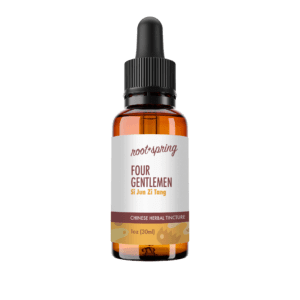 Si Jun Zi Tang (Four Gentlemen) – Liquid Extract (Tincture)
Starting at $14.00
Add to CartSelect options
This product has multiple variants. The options may be chosen on the product page
Si Jun Zi Tang (Four Gentlemen) – Liquid Extract (Tincture)
Starting at $14.00
Add to CartSelect options
This product has multiple variants. The options may be chosen on the product page
Four Gentlemen – Si Jun Zi Tang
Si Jun Zi Tang is a widely used formula for boosting energy and stamina. This can be a great daily supplement to keep your body functioning well if you typically find yourself fatigue, low on energy, or worn out.
-
Sale!
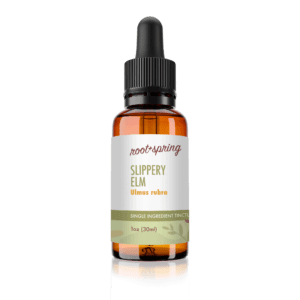 Slippery Elm (Ulmus Rubra) – Liquid Extract (Tincture)
Starting at $14.00
Add to CartSelect options
This product has multiple variants. The options may be chosen on the product page
Slippery Elm (Ulmus Rubra) – Liquid Extract (Tincture)
Starting at $14.00
Add to CartSelect options
This product has multiple variants. The options may be chosen on the product page
Slippery Elm
While not a traditional Chinese herbal formula, this Slippery Elm extract is a highly effective product for soothing sore throats and coughs. It can be used on the skin to heal wounds or sores. Slippery Elm is also a commonly used formula for digestive issues in dogs and cats. Use for constipation, diarrhea, or general GI tract troubles.
Du Huo Ji Sheng Tang
Du Huo Ji Sheng Tang is a popular formula to relieve chronic backaches and joint pain. While it works wonders for aching humans, this is also a great choice for pets with back pain, soreness, hip dysplasia, lameness, or general weakness in senior pets.
-
Sale!
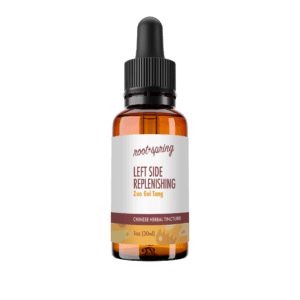 Zuo Gui Tang (Left Side Replenishing) – Liquid Extract (Tincture)
Starting at $14.00
Add to CartSelect options
This product has multiple variants. The options may be chosen on the product page
Zuo Gui Tang (Left Side Replenishing) – Liquid Extract (Tincture)
Starting at $14.00
Add to CartSelect options
This product has multiple variants. The options may be chosen on the product page
Zuo Gui Tang
Zuo Gui Tang is a formula used to boost and nourish yin in the body. Yin depletion occurs with aging, after labor, after a long-standing or difficult illness, excessive drug or alcohol abuse, or simply as a constitutional imbalance. A lack of yin leads to issues with fertility, insomnia, dry skin and hair, dry mouth, irritability, fever, hot flashes, hair loss, dizziness, and tinnitus.
Gan Mao Ling
Gan Mao Ling is a popular formula used to treat early colds. Take this tincture in hot water at the onset of a cold or flu to kick illness to the curb.
Healing Made Easy with Liquid Extracts
Taking Chinese herbs should be fun and easy. Unfortunately, many people have trouble staying on top of their herbal dosages or dislike taking another “vitamin” or pill. Liquid extracts make taking your herbs easier than ever.
If you are looking for an easier way to take your daily herbs or a seamless approach to giving your child or pet their herbal medicine, give our line of liquid extracts a try. Contact us with any questions or curiosities about our natural and safe herbal liquid extracts!


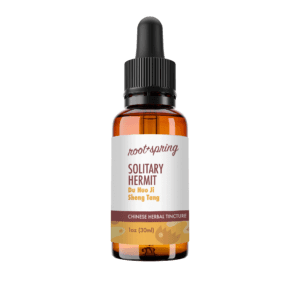 Du Huo Ji Sheng Tang (Solitary Hermit) – Liquid Extract (Tincture)
Du Huo Ji Sheng Tang (Solitary Hermit) – Liquid Extract (Tincture)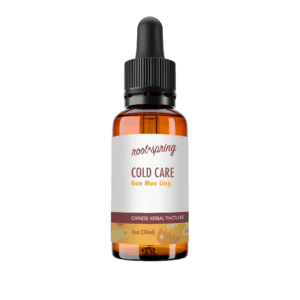 Gan Mao Ling (Cold Care) – Liquid Extract (Tincture)
Gan Mao Ling (Cold Care) – Liquid Extract (Tincture)